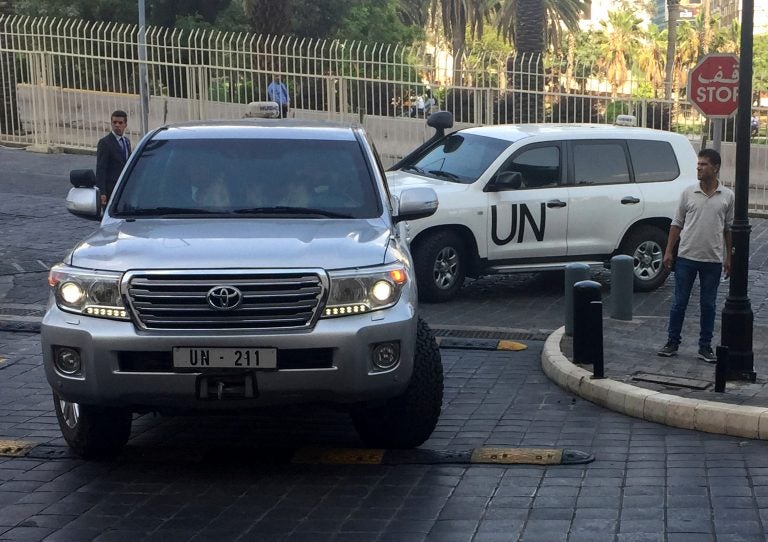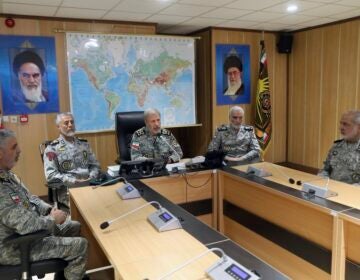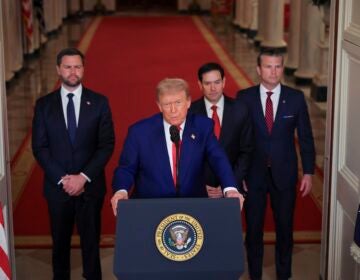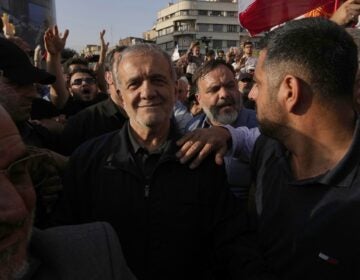UN team fired on at suspected Syria chemical attack site
Gunmen shot at the U.N. team in Douma on Tuesday and detonated an explosive.

In this Saturday, April 14, 2018 file photo, UN vehicles carrying the team of the Organization for the Prohibition of Chemical Weapons (OPCW), arrive at hotel hours after the U.S., France and Britian launched an attack on Syrian facilities for suspected chemical attack against civilians, in Damascus, Syria. The OPCW has been thrust once again into the international limelight by a nerve agent attack on a former Russian spy in Britain and allegations of a chemical bombardment on the Syrian city of Douma. It is now attempting to investigate, but its experts have not yet been able to visit the scene. (Bassem Mroue/AP Photo, File)
Assailants opened fire at a U.N. security team visiting the site of a suspected chemical weapons attack in Syria, an official said Wednesday, forcing it to retreat to its base and further delaying a fact-finding mission by outside experts to examine the claims.
Gunmen shot at the U.N. team in Douma on Tuesday and detonated an explosive, leading it to return to Damascus, said the head of the international chemical weapons watchdog, Ahmet Uzumcu. He did not identify the assailants.
Inspectors from the Organization for the Prohibition of Chemical Weapons have been waiting since Saturday to visit Douma, the site of the alleged April 7 attack. They were initially blocked by the Syrian government and its ally, Russia, on Monday. Then on Tuesday, the advance security team from the U.N. came under fire, compounding the delays. The OPCW inspectors have not yet been able to visit the site, and Uzumcu did not say when they would deploy.
The town is under the protection of Russia’s military police. The Russian military said a Syrian security employee was slightly wounded in the crossfire Tuesday, but no Russian servicemen were at the site of the attack.
Journalists visiting Douma on a government-organized tour Monday did not report any security threats. The Associated Press met with residents who said they were overwhelmed by chlorine fumes on the night of the alleged attack, and lost their loved ones.
With 11 days now having passed, concerns are growing that evidence could fall prey to tampering or be otherwise compromised.
In response, the opposition’s Syrian Civil Defense, whose first responders were operating in Douma on the night of the alleged attack, gave the chemical weapons watchdog the locations of victims’ graves so it could salvage evidence, the group’s chief, Raed Saleh, told the AP. The Civil Defense no longer has a presence in Douma after being evacuated to rebel-held areas of northern Syria when the government took over the town. The government says the Civil Defense is a terrorist organization.
The U.S., which has drawn its own conclusions about the attack on Douma, accused the Syrian government and Russia of trying to cover up evidence of their culpability. Washington has not released any details of the evidence it has collected.
Russia and the Syrian government denied responsibility for the alleged attack, which took place during a government assault on the then rebel-held town. The Army of Islam surrendered Douma two days later.
The U.S., France and Britain struck against suspected chemical weapons facilities belonging to the Syrian government on Saturday, after concluding that Syrian President Bashar Assad’s forces were behind the attack.
Russia has accused the rebels of staging the attack with support from Britain, an allegation that Britain has strongly denied.
Syrian state media reported Tuesday that OPCW inspectors had entered Douma, but the Syrian government later said that only a U.N. advance security team went in.
U.S. State Department spokeswoman Heather Nauert said Tuesday the U.S. did not believe the inspectors had entered Douma, and that the evidence was at risk of being compromised as delays dragged on.
“We’ve seen that the Russian government and the Syrian government — their whole goal in this is to try to cover up. Their goal is to try to deflect attention,” she said. “But the fact of the matter is that Bashar al-Assad is responsible yet again for gassing and killing innocent men, women and children.”
Russia’s military said Tuesday it had uncovered a chemical weapons stockpile left behind by the rebels in Douma. The claim could not be independently verified.
First responders and activists say more than 40 people were killed the night of the attack, many found with foam around their mouths, a sign of suffocation. Medical workers said they treated symptoms including difficulty breathing and fainting.
If confirmed, it would not be the first chemical weapons attack in Syria’s more than 7-year-old civil war. The U.N.-mandated Independent International Commission on Syria has documented more than 30 chemical attacks in Syria between 2013 and the end of 2017 — and says at least 25 of them were carried out by the Syrian military. For the rest, it had insufficient evidence to determine the perpetrator. Most involved chlorine gas.
Meanwhile, Syrian state media reported that rebels in a town northeast of Damascus were surrendering their weapons as part of an agreement to hand over control to the Syrian government.
Fighters from the Army of Islam and their families were to leave the town of Dumayr as part of the arrangement, the state-affiliated al-Ikhbariya TV station said. Some 1,500 gunmen and 3,500 others were expected to relocate to opposition-held territory in northern Syria, it said. The Syrian military would then resume control.
The U.N. and human rights agencies say such arrangements amount to forced population displacement, a war crime. They say civilians should not be forced out of their homes in war.
Corder reported from The Hague. Associated Press writer Zeina Karam in Beirut contributed to this report.
WHYY is your source for fact-based, in-depth journalism and information. As a nonprofit organization, we rely on financial support from readers like you. Please give today.




